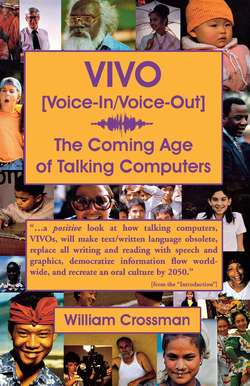Читать книгу VIVO Voice-In / Voice-Out - William Crossman - Страница 12
На сайте Литреса книга снята с продажи.
Musing 2
ОглавлениеSometimes, however, we seemingly go with the new technology and don’t drop the old. The car definitely seems to have replaced the horse-drawn carriage in the industrially-developed countries. Yet radio, which many people thought would be replaced by TV in the electronically-developed countries, has survived and appears healthy.
When does a new technology, such as VIVO, replace an older technology, such as text, and when do new and old continue to coexist? What conditions must be present for replacement, or coexistence, to occur?
It’s a discussion that gets to the heart of the debate swirling around this book’s thesis. While I forecast that VIVOs will replace text in the electronically-developed countries by 2050, others argue that text and voice recognition will continue to coexist in the computers and societies of the future. While I model my view on the car’s replacement of the carriage, they model theirs on TV’s non-replacement of radio. Who’s right?
Those who disagree with my thesis seem to have banked their argument on two points. The first is that written language is so central to survival in our print-literate societies that we can’t imagine life without it and won’t ever abandon it. Point two is that, in the future, written language will still allow us to do certain information-accessing jobs better than VIVOs will, and that this advantage will guarantee written language’s long-term coexistence with voice-recognition software and computer graphics.
In Chapter 6, subtitled “Searching for Information Using Sound and Image but No Text,” I wrestle with this second point in very specific terms, arguing that, in fact, VIVOs will do those certain information-accessing jobs better than text will. For the remainder of this chapter, I want to address the two critique points above in a more general, overall way. Along the way, I hope we can gain some insight into the nature of technologies and how they evolve, and also into some of the ways people, rightly or wrongly, think and talk about both familiar and new technologies.
Some people, as I said in Chapter 1, think that written language/text has become as basic, irreplaceable, and necessary to our survival as food, water, and sleep. I’ll explain why I disagree.
Let’s begin by creating a couple of concept-tools to work with. We’ll call an activity that every human society needs in order to survive a basic survival activity. Eating, drinking, sleeping, finding shelter and/or clothing, reproducing, transporting ourselves, and communicating information are some basic survival activities. There’s a lot of room for discussion here. I think that creating music, song, dance, theater, visual arts, poetry, stories, ritual, science, mathematics, and engineering fall into this category. You may disagree with some of these, and you may want to join me in adding others. Importantly for this discussion, I want to add storing and retrieving information to this list.
A second concept-tool: let’s call any activity that exemplifies the primary way a specific society carries out one of these basic survival activities a culture-based essential of that society.
Take shelter and/or clothing, for example. The primary way this basic survival activity is exemplified in the industrialized countries is that most of us —with the exception of some homeless and/or very poor people—live within some kinds of structures or buildings and wear clothes that cover most of our bodies and protect the soles of our feet. There are other societies that do not shelter and/or clothe themselves in these ways.
For most people in industrialized countries, then, living in buildings and wearing clothes and footwear are culture-based essentials. This may change with global warming, new technological advances, new attitudes towards nudity, and so on, but for now, buildings and clothes are essential to us. The categories of basic survival activities don’t change over time; the culture-based essentials of a society are always changing.
Now, let’s put these tools to work. Some people I’ve talked to about the thesis of this book get very upset. Writing/reading, they say, is here to stay. VIVO computers will not replace text in print-literate cultures because text has become basic to our survival as a species. We depend so much on written language to communicate, that giving it up is an unthinkable option.
I think they’re wrong. They’re confusing writing/reading as a basic human survival activity—which it isn’t, and has never been—with writing/reading as a culture-based essential of a handful of societies around the world—which it has been for centuries but won’t be for much longer.
Information storage and retrieval, not writing and reading, is the basic survival activity. Writing and reading has just been the primary way—the culture-based essential method by which—we’ve stored and retrieved information in the print-literate countries. This doesn’t mean that most people in these countries are functionally literate. It means that it has been via the written
